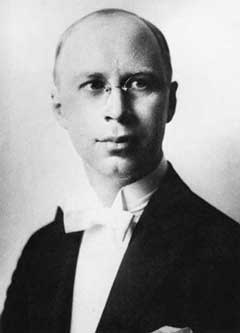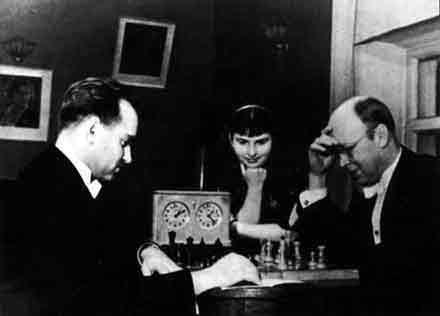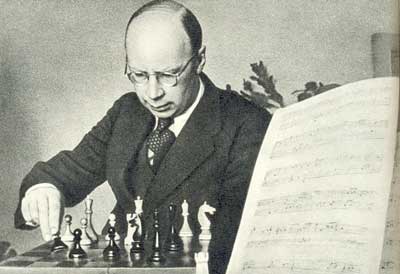|
I remember having read an interview with Peter Yarrow (formerly of the legendary
folk trio
Peter, Paul and Mary) in which he said that as an art student at Cornell
(Cornell
is where Daniel Willard Fiske served
as Librarian and Professor of North European Languages) all the music majors
painted and all the art majors played guitar. In Russia it seems that all
musicians play chess.
I'm not schooled in classical music and would be more inclined to listen to
Peter, Paul and Mary, but I understand the qualitative distance that
separates the two of them. So, when
Lawrence
Totaro sent me some casually offered information on the great Russian
conductor, Sergei Prokofiev, I decided to look into his relationship with chess.
Prokofiev was born on April 27, 1891 and died on March 5, 1953. He was
considered a child prodigy having composed his first opera at the age of nine
(two years after he learned to play chess). He was a notable pianist as well as
one of the great composers of the 20th century. Working in different
genres - opera, ballet, symphony, concerto, even children's music - his works
were considered quite controversial and avant-garde.

Mr. Totaro had sent me excerpts from three books mentioning Prokofiev's interest
in chess: Prokofiev.
Contributors: Florence Jonas - transltr, Israel V. Nestyev - author. Publisher:
Stanford University Press. Place of Publication: Stanford, CA. Publication Year:
1960.
Page 20
The future composer was very observant and inquisitive about
everything around him. Once, on a train, he wormed his way into the engineer's
cab, where he inquired in detail about the mechanics of a locomotive. ("It
wasn't especially comfortable in the cab, but I looked at everything around me
with delight. Any fourteen-year-old boy would have envied me!") At that time
Seryozha was also very much interested in photography, botany, and chess. Among
his childhood manuscripts, musical sketches alternate with records of chess
games.
Page 81
Along with music Prokofiev was extremely enthusiastic about
chess. He frequented the chess club in St. Petersburg, spending hours on
simultaneous games and seeking opportunities to play with formidable opponents.
He also took some interest in sports, and for a while he regularly attended the
gymnastic drills of the Sokol. This led him to write a sports march, which the
society published.
Page 409
He neither visited the Composers' Union nor attended concerts;
he no longer conducted and almost never played the piano; he did not go to the
telephone; he even gave up chess, which he had loved since childhood. Everything
was subordinated to his work. As before, he refused to abide by his doctors'
orders. "The doctors really do not understand," he said, "that it is easier for
me to jot down a melody than to keep it in my head." He found disruptions in his
routine distressing. In 1949 he became so ill that he almost died. Once again he
was put on a "starvation diet" of work -- one hour a day -- but no restrictions
could curb his imagination.
Composers on Composers.
by John L. Holmes; Greenwood Press, 1990
Page 111
STRAVINSKY'S view of Prokofiev was this:
Prokofiev was the contrary of a musical thinker. He was, in fact, startlingly
naive in matters of musical construction. He had some technique and could do
certain things very well, but more than that, he had personality; one saw it in
his very gestures, biological personality let us call it. His musical judgments
were usually commonplace, however, and often wrong.... But one could see
Prokofiev a thousand times without establishing any profound connection with
him, and we rarely discussed music when we were together. I used to think that
Prokofiev's depths were engaged only when he played chess. (Igor
Stravinsky, Memories and Commentaries ( London: Faber, 1960), 6768.)
Notes of a Moscow Pianist. Contributors:
Dmitry Paperno - author. Publisher: Amadeus Press. Place of Publication:
Portland, OR. Publication Year: 1998.
Page
78
Chess played an important role in his life, except for his final
years, when the doctors forbade him to play. He had friendly relations with two
world champions, Capablanca and Botvinnik. A poster of his match with Oistrakh,
another potent chess player, is preserved in one of Moscow's clubs. Both were
ranked in the first (quite a high) category in chess.
Page
152
In the summer of 1970, we vacationed again in Päarnuu, one of
our favorite spots. There we met more and more often with David Feodorovich
Oistrakh, spending several hours a day playing chess and preference (an old
Franco-Russian card game, something like bridge), and talking with
ever-increasing candor. Oistrakh's lifelong love of chess is widely known.
Officially ranked in the first category, he actually played at the level of a
master's candidate, was friendly with many leading grandmasters, including a few
world champions, and never missed an opportunity to attend chess tournaments and
world title matches. It was a real pleasure to play casual games with him (he
always brought a chess clock to Päarnuu) -- his graceful manners and unaffected
chess style made him the best possible partner.
My own investigations resulted in the
rest of this page
On May of 1914, Prokofiev took
part in three simuls - on three consecutive days - given by Capablanca
during the St. Petersburg Tournament. He lost the first game ("I
was a bit annoyed with losing - till then, I had never lost a simultaneous
game"). In recompense, he had met Lasker who gave
him an open invitation to visit with him in Berlin.
In the second game, Capablanca
fell for a trap ( "I was thrilled that I had caused Mister Champion a
problem") and Prokofiev secured what he believed to be a winning position but
Capablanca equalized and then won
with a fine combination. ("I couldn't prevent myself saying 'You devil!').
The final encounter the following
day gave Prokofiev the victory he sought. This time it was Prokofiev who
found a fine combination, winning a piece and ultimately the game.
After this simul, Prokofiev and
some others, including Capablanca were invited to a friend's house for tea
("I watched Capablanca and it was interesting to see how unaffected he
was"). Prokofiev entertained the group on the piano to see Capablanca's
reaction ("He listened with obvious pleasure but displayed total
ignorance"). Prokofief was only 23 and had not yet reached the height of his
fame, but, as we'll see later, he must have made an impression on
Capablanca.
[see
http://www.sprkfv.net/journal/three02/thegame.html
for the full text of
Prokofiev's games with Capablanca]
|
|

David Oistrakh and Sergei Prokofiev, 1937
David Oistrakh was one of the greatest violinists of the 20th
century. He was also a category one chess player. This story is told of the first meeting
between Prokofiev and Oistrakh: Prokofiev attended a concert in Odessa in
1927 in which 18 year old David Oistrakh was performing a selection from
Prokofiev Violin Concerto No. 1. Prokofiev became incensed at Oistrakh's
interpretation and shouted from his seat, “No, that is not the way to play it,
young man!” Everything was suspended as Prokofiev marched on stage and
accompanied Oistrakh on piano with the intention of directing his play. Ten
years would pass before these two men would meet again and under much different
circumstances. Oistrakh, now an award-winning (First Prize at the Queen
Elisabeth Competition in Brussels, 1937) soloist, met Prokofiev from across a
chessboard. [see
http://www.carnegiehall.org/textSite/box_office/events/evt_6376.html]
The November 9,
1937 match was won by Oistrakh.
The terms were that ten games
were to be played at the rate of twice a week and in the evenings. The time
control was thirty-six moves in two hours and ten moves every hour after that.
Only seven games were played and only the score of one game remains.
The remaining
material is culled from Edward Winter's
Chess
Note 4913 Mikhail
Botvinnik wrote an article of Prokofiev in 1954 that was published, along with
this photograph, in S. Prokofiev Autobiography Articles Reminiscences
(Moscow, 1959).
I met Prokofiev in 1936 at the height of the Third International
Chess Tournament in Moscow. He was a first-rate chess player himself and never
missed a match. His position in the tournament was a delicate one and he
maintained a strictly neutral attitude throughout, for while his sympathies were
naturally with me as the young Soviet champion, he could not wish for the defeat
of the ex-world champion Capablanca, who was a personal friend of his.
 Several
months later Capablanca and I shared first place at the tournament in
Nottingham, England. When the tournament was over I received a telegram of
congratulations from Sergei Sergeyevich. I was naturally very pleased and,
without thinking, I showed the wire to Capablanca, who was with me at the time.
At once I saw that I had made a mistake – from the expression on Capablanca’s
face I realized he had not received a wire from Prokofiev. Two hours later
Capablanca came to me beaming – he had received a telegram too. Of course,
Sergei Sergeyevich had sent both wires at the same time, but evidently the
Moscow telegraph office clerks had felt that the Soviet champion ought to get
his message first. Several
months later Capablanca and I shared first place at the tournament in
Nottingham, England. When the tournament was over I received a telegram of
congratulations from Sergei Sergeyevich. I was naturally very pleased and,
without thinking, I showed the wire to Capablanca, who was with me at the time.
At once I saw that I had made a mistake – from the expression on Capablanca’s
face I realized he had not received a wire from Prokofiev. Two hours later
Capablanca came to me beaming – he had received a telegram too. Of course,
Sergei Sergeyevich had sent both wires at the same time, but evidently the
Moscow telegraph office clerks had felt that the Soviet champion ought to get
his message first.
Sergei Sergeyevich was passionately fond of chess. He took part in the chess
activity of the Central Art Workers’ Club. Moscow chess players still remember
his rather unique match with David Oistrakh – the winner was awarded the Art
Workers’ Club prize and the loser had to give a concert for the club members.
[The full text and larger picture can be found at
http://www.chesshistory.com/winter/winter32.html ] |
|

